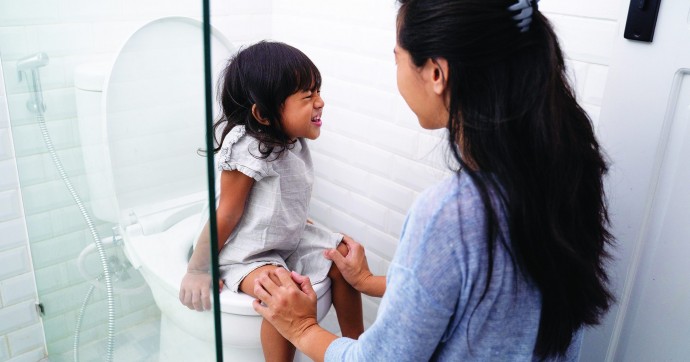Lately, your child seems to use the toilet less frequently and complains of pain every time he passes stools. Could he be having constipation?
Is my child constipated?
Typically, your child may be constipated if he has less than three bowel movements a week, or less often than he usually does. His bowel movements are usually hard, dry, difficult and painful to pass. If you suspect that he is constipated, check whether his stools are larger than usual. There may also be traces of stool in his underwear.
He would likely avoid doing his ‘big business’ as it would be painful. As he tries to hold his bowel movement, he may be making faces, twisting his body, or crossing his legs. Other signs include stomach-ache, bloating, loss of appetite, and general crankiness.
Not ‘hard’ causes
Constipation happens when waste material moves too slowly through the large intestines, causing stools to become large, hard and dry. Common causes include:
- Diet: Your child may not be consuming enough fibre from fruits, vegetables or whole grains. He may not be drinking enough water (the job of large intestines is to absorb water from waste causing stools to harden). Dietary changes (e.g. transition from breast milk to cow’s milk) can potentially be a factor leading to constipation.
- Withholding: Your child may ignore the urge to go to the toilet for many reasons. He may simply want more time to play or watch television, or dislike using toilets that are unfamiliar to him. He may also have had a painful experience during toilet time due to difficulty passing out the hard stool, causing him to withhold his bowel movement.
- Routine changes: Your child may feel uncomfortable in a new environment or with a new routine (e.g. travelling, moving to a new home, starting school) and this can affect his bowel movement.
Relieving constipation
Consider these measures for a smooth and less painful time when your child passes motion:
- Offer high-fibre foods. Fibre in fruits, vegetables, beans, and whole grains helps to retain water and provide the bulk in stool, stimulating it to move forward and pass easier. Introduce high-fibre diet gradually if your child is not used to it.
- Increase fluid intake. Water helps to soften stool. Make sure your child drinks enough water daily, especially if he is active or unwell.
- Good toilet habit. Encourage your child to keep a regular toilet schedule. Set a time after each meal for him to use the toilet. Putting a footstool under his feet can help him push. Let him wait for at least 10 minutes and praise him if he manages to pass stools. Also, remind him to never delay going to the toilet whenever an urge comes.
- Regular physical activity. Keep the bowels moving by staying active. Get your child to play sports or exercise at least 30-60 minutes a day.
- Keep the gut healthy. A good balance of good and bad bacteria in the gut is key to a good gut health. Apart from healthy diet and lifestyle, maintain the gut balance by consuming food containing probiotics (good bacteria) such as yoghurt and culture milk.
Constipation in children is common and usually not serious, but can lead to complications, such as encopresis (leaky stools) and anal fissures (skin tears around anus due to hard stool) if it lasts longer than 2 weeks. Take your child to a doctor if the condition persists or is accompanied with fever, vomiting, blood in the stool or other worrying symptoms such as significant weight lost and persistent abdominal pain.
Reminder: Do not give laxatives or administer an enema to your child unless prescribed by the doctor. Laxatives can sometimes impair the normal function of the large intestine.






Comments